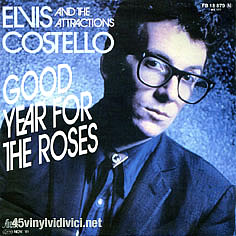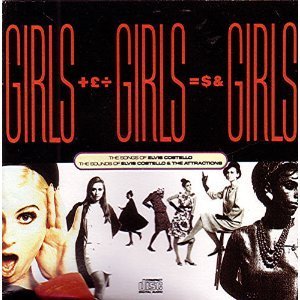

The second stage really starts with 1982's Imperial Bedroom. The higher production values and intensely structured songwriting mark out Costello's intention of staking a claim to the status of classic songwriter and the album, against the odds, benefits enormously from the grand ambitions of all involved. The songs really are great, massive demonstrations of the power of ego and talent combined. From the dark undertones of sinister opener 'Beyond Belief' to the brilliant pop formalism of 'You Little Fool', the various shades of rock music as smart-arse pop are given free rein on Imperial Bedroom and although there are occasions when the technicality of the execution overwhelms the songs ('The Long Honeymoon', 'Kid About It', 'Town Crier'), in various ways it represents the peak of Costello's talents. The extras on the CD reissue are pretty good and show that there really wasn't much fat in terms of what was recorded for Imperial Bedroom, it was pretty much all decent stuff. The fussy overproduction continues with Punch the Clock (1983), but this time round the songs are starting to get a bit saggy and the synth heavy production is cluttered and messy, making Punch the Clock a fairly dated and unenjoyable listen. There are some great songs ('Everyday I Write the Book', 'Mouth Almighty' and especially the glorious and furious 'Shipbuilding') but the whole thing is too heavy and dense and most of the songs are forgettable at best and in some ways the signs are there that Costello should have left off recording while dealing with the various personal issues he was contending with at the time.


The first album that I haven't got is the universally derided Goodbye Cruel World, so we skip straight on to Costello's triumphant creative renaissance, 1986's double whammy of King of America and Blood and Chocolate. King of America is Costello's Attractions-less reinvention of Get Happy!'s stylistic grasshopping and it's a wonderful record. The cues are less obviously soul and R&B this time around, but to a large extent his beloved country & western instead. The C&W on King of America is telling, Costello's original country tunes are leagues better than his covers on Almost Blue, and it's the confidence on King of America that is so reassuring. It may be that stripping back the early 80's production and focussing on getting the songs right allowed him to feel more comfortable, but whatever the case, it's a much more enjoyable record and a considerably better one than anyone would have expected at the time. There are a couple of missteps (an ill-advised cover of 'Don't Let Me Be Misunderstood' for example), but they are rare and when there are songs as good as 'Indoor Fireworks' a couple of duff moments are easily forgiveable. Better yet though is the album with the Attractions, Blood and Chocolate. It's an appropriate title, the sound is thick, sludgy and ragged and it suits the tone of the dark, sinister songs absolutely perfectly. And what songs these are, vicious, biting slabs of enigmatic misanthropy, set to some of Costello's most energised and exciting music in ages and you can't help but think that a couple of years apart must have allowed Costello and the Attractions to revitalise. There's no trace of country and western here, and no sense of production at all let alone overproduction, it's simply rock music at it's most simplistically caustic. It's really fabulous stuff. The extras on Blood and Chocolate are a bit less impressive though.


Next up is the 1989 compilation Girls Girls Girls, which is a great double album comp covering Costello's career to 1986 but everything on it has been covered by what we've already listened to, so it's on to the final bit of Costello, 1989's Spike. Spike is a mixed bag and it's also a victim of a difficult trend in the late 80's of having single albums reaching an hour in length, which is always too much. It's an exhaustive, exhausting listen, not least because the songs are not Costello's finest. There is some entertaining vitriol (his anti-Thatcher number 'Tramp the Dirt Down' is great) but on the whole it's a long way from the quality of his best work. That said, it's a lot smarter and a lot better structured and pieced together than most records of the time, but perhaps that's its downfall - it's just too adult an album. And that cover, good lord....


No comments:
Post a Comment